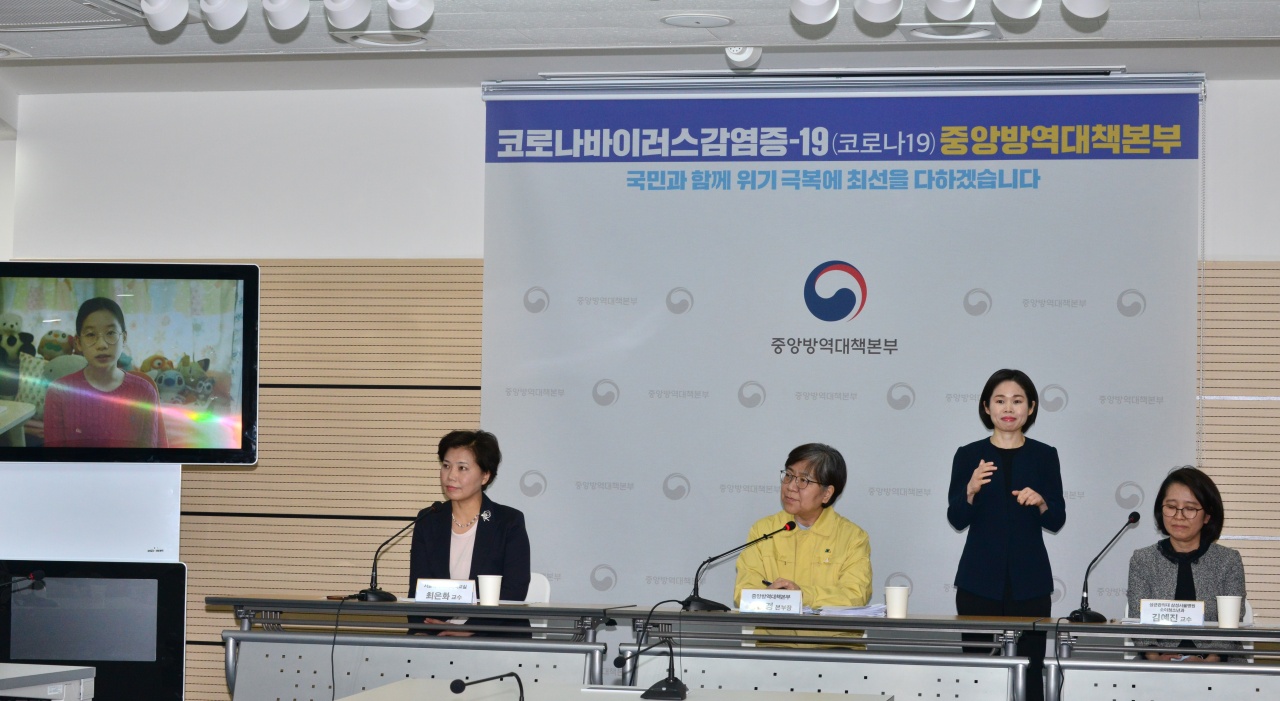COVID-19: Kids have questions, too
KCDC holds kids Q&A ahead of Children’s Day
By Kim ArinPublished : April 29, 2020 - 18:20

With the spring semester postponed indefinitely, children in Korea are staying home to stay safe from COVID-19 and help reduce its spread.
The Korea Centers for Disease Control and Prevention held a kids Q&A session on Wednesday, marking the upcoming Children’s Day holiday observed each year on May 5, to address their concerns and curiosity about the new virus.
This is the disease control agency’s first novel coronavirus briefing featuring children since it started holding the daily televised updates from Jan. 29.
Two pediatricians and KCDC experts including the director Jung Eun-kyeong responded to some dozen queries from kid reporters in Daegu and Gyeonggi Province, as well as nursery and preschool children.
Most questions were about understanding the nature and dynamics of the disease, the first being, “Do you have to get surgery if you catch the coronavirus?”
Pediatric infectious disease professor Dr. Choi Eun-hwa of Seoul National University Hospital said, “Fortunately, it is very rare that children have to undergo surgery from COVID-19.”
“But because the virus can cause symptoms like cough, fever and stomachache, you may need to get treated with medications,” she said.
Asked if kids were less likely to get the virus than grownups, pediatrician Dr. Kim Yae-jean of Samsung Medical Center in Seoul said that was uncertain.
“Grownups travel more and mingle with a lot more people, which is one explanation why we are seeing more adult patients,” she said.
“However, children can still get sick with the virus so practicing hygiene and not going to crowded places are important."
Other questions that popped up concerned social distancing.
To a preschool child asking if she was allowed to invite friends to her birthday party, Kim replied, “Because we can meet friends as much as we’d like to once the virus goes away, we can try something else for now -- like a FaceTime birthday party.”
To another asking, “If my friend had the COVID-19, can I still hang out with her?” Kim said, “Once she fully recovers and no virus is detected in her body after sufficient time passes, it is safe to hang out again.”
Children also wanted to know when they would be able to go back to school.
Choi of Seoul National University Hospital said, “Singapore, which reopened school recently, had to close again after the cases surged. When we open schools, there’s going to be a lot of group events. We want to be careful about that.”
The latest KCDC data shows patients aged under 20 totaled 730 as of Wednesday, accounting for 6.7 percent of all confirmed cases.
So far, pediatric and adolescent cases here have been mild, according to pediatric infectious disease expert Dr. Eun Byung-wook of Nowon Eulji University Hospital in Seoul.
“Children appear to be at reduced risk of developing serious illness from the viral infection compared to adults. Most have suffered only slight symptoms,” he said in a phone interview.
But because they could still pass on the virus to those who are more vulnerable, plans with grandparents are better put off for a while, he said.
Parents were urged to practice stringent physical distancing, especially once schools reopen.
“Parents are advised to steer clear of dinner parties, dining out and other social gatherings,” he said. “Making extra efforts to limit outings, such as having one person shop for groceries instead of the whole family, can go a long way.”
Eun added that children with underlying medical conditions or who are otherwise immunocompromised were at higher risk from COVID-19. Babies aged 3 months or younger also belonged to the at-risk group.
Pediatric psychiatrist Dr. Kim Hyo-won of Seoul Asan Medical Center said while school is out of session, preventing the daily routine from becoming upended could be one way of reducing anxiety.
Kim said the younger children have only a vague understanding of the new disease outbreak.
“They want to know why they can’t go to the playground or see their friends,” she said. “Use age-appropriate language to help them understand.”
Reassuring the children while helping them feel informed is also important.
“While having a conversation about the virus, tell the kids about what the adults are doing to improve the situation,” she said. “You can say, for instance, the scientists and doctors were figuring out how to make the cures and keep people safe.”
By Kim Arin (arin@heraldcorp.com)



![[Exclusive] Korean military set to ban iPhones over 'security' concerns](http://res.heraldm.com/phpwas/restmb_idxmake.php?idx=644&simg=/content/image/2024/04/23/20240423050599_0.jpg&u=20240423183955)




![[Pressure points] Leggings in public: Fashion statement or social faux pas?](http://res.heraldm.com/phpwas/restmb_idxmake.php?idx=644&simg=/content/image/2024/04/23/20240423050669_0.jpg&u=)
![[Herald Interview] 'Amid aging population, Korea to invite more young professionals from overseas'](http://res.heraldm.com/phpwas/restmb_idxmake.php?idx=644&simg=/content/image/2024/04/24/20240424050844_0.jpg&u=20240424200058)










